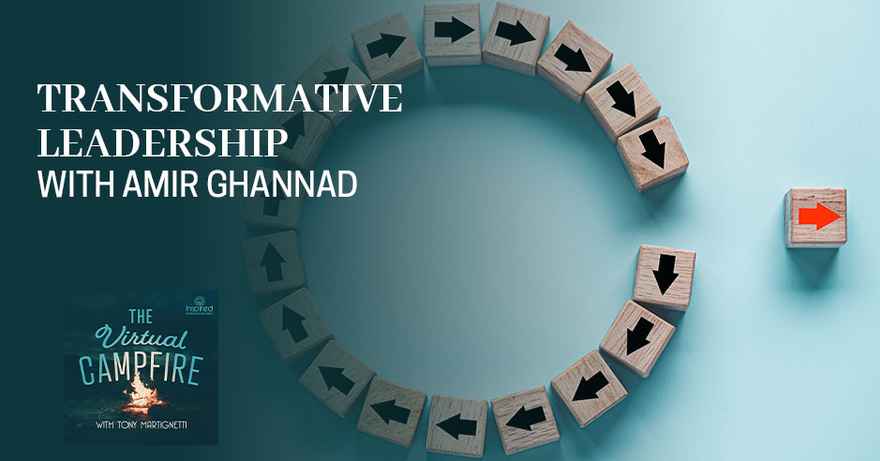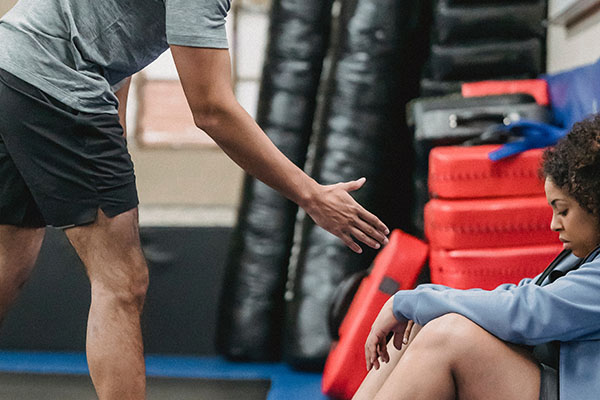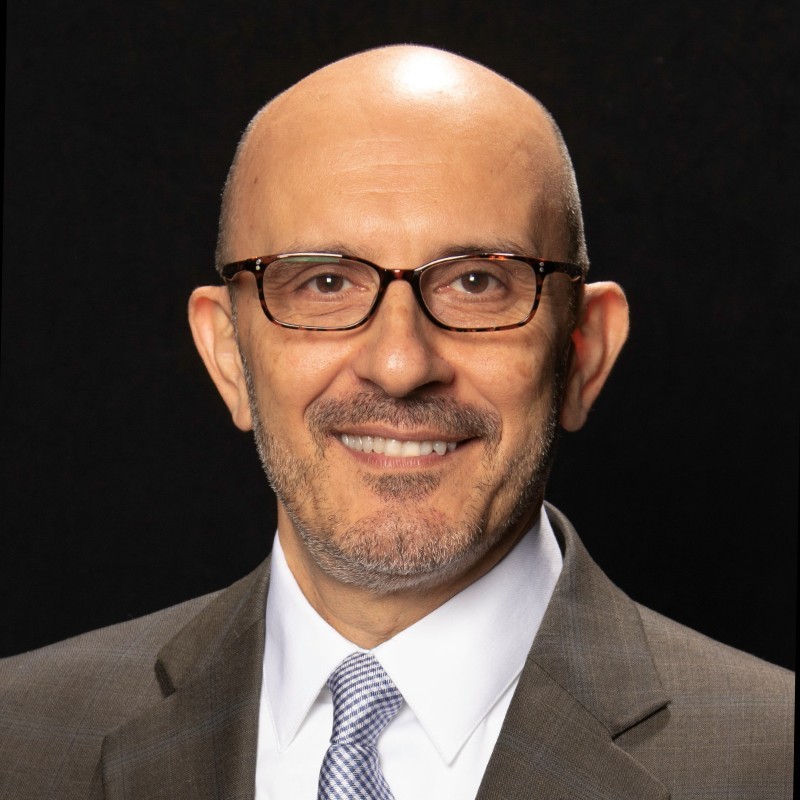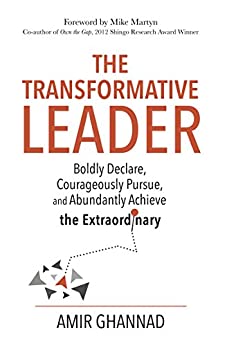Transformative Leadership With Amir Ghannad

Learn how to be a transformative leader today! One of the most important aspects of a leader is to take full responsibility for things and acknowledge why you aren't progressing. The leader is in charge of the work culture and the people, so that leader needs a good chunk of empathy. Learn empathy with your host, Tony Martignetti and his guest, Amir Ghannad. Amir is the founder of the leadership guidance company called the Ghannad Group. He is also the author of The Transformative Leader and the host of a podcast by the same name. Learn the difficult beginnings of Amir's life and how he took charge of it to create success.
---
Listen to the podcast here:
Transformative Leadership With Amir Ghannad
Somewhere during those six months in Boston, it occurred to me that I have it in me to deal with whatever challenges come my way. Before that, I didn't relate to myself like that. Everybody always took care of me. I went from this kid who didn't have much confidence. I was a shy kid to someone who says, “If you're going to survive, you're going to have to fend for yourself.”
---
It is my honor to introduce you to my guest, Amir Ghannad. Amir is a highly sought-after keynote speaker at leadership summits in the US and abroad. He’s the Founder of The Ghannad Group, which offers speaking, workshop facilitation and consulting services focused on guiding leaders in creating extraordinary cultures that deliver breakthrough results and unprecedented fulfillment. For over 31 years, Amir held leadership positions of increasing responsibility and scope in multiple locations in the US, Southeast Asia and Europe. Amir’s first book, The Transformative Leader, has been shipped to over 30 countries. It’s a fantastic book. It's available in multiple languages. Welcome to the campfire. How are you doing?

It's a pleasure to be here. I'm doing great, Tony. I've been reading your blogs. I have been excited about being on this blog with you. I'm learning so much. I love the way you're doing this.
Thank you so much. That's a real honor to hear from you. I love your podcast, too. It's been a pleasure to see that come together.
Thank you so much.
I'm thrilled to be able to hear your insights, your story and share this with the audience. What we do here on the show is we go through what's called these flashpoints, which are these points in people's stories that ignited your gifts to the world. I know that we're going to cover so much great ground on the show. I'm looking forward to giving you the space to share that. You can share what you're called to share. We're going to open the forum to let you have that. Along the way, we'll pause and see what shows up and see where we go.
Thank you so much, Tony. Hopefully, I would give a brief overview of my background because it plays so much into who I am now and what I do. I grew up in Iran. I came to the states when I was sixteen years old on my own. I didn't know anybody here. I didn't know the language. I had taken a few years of English but I could not have a conversation with anybody in English. What was going on was that there was a revolution brewing in Iran in 1978. My parents wanted me to get out, get my education and then you know go back. The idea was that I would visit every year and this stuff was going to blow over.
Do what you got to do to get through the moment and thrive.
Fast forward, I didn't get to go back home for several years. I didn't see my brothers or other family members for several years. In July 1978, I came to the States. The only thing I have is the address to a high school and I give this to a taxi driver in Boston, Massachusetts. He takes me over there. The school is closed and it's raining like there's no tomorrow. A policeman comes and finally helps me understand that the school isn't going to open that day. He takes me to a hotel and I get a hotel room. The next day, I go back. Sure enough, they're open.
Years later, after I wondered why Americans would celebrate my arrival every year, I figured out that the 4th of July was a special day in America. That was the day of my independence as well. I had a series of challenges. The high school put me up in a dorm that belonged to a college. A few weeks later, they kicked all the high school students out of the dorm. I was out there without a place to stay. I found a few people, three other guys who were in the same situation. We found an apartment, somehow. Don't ask me how but we survived. We made it through.
Unfortunately, a couple of weeks later, I got beat up. I got a fairly savage beating, broken bones and that stuff. I tell you that part of my story to say that I was living a fairly sheltered life. I was the first grandchild in the family, everybody loved me and then I found myself in a situation where I had to fend for myself in a foreign country. There was no FaceTime at the time. My only means of communication with my parents was every two weeks I would get a roll of quarters, go to a payphone and get three minutes with them to let them know I was still alive.
When you talk about flashpoints, from a personal perspective, somewhere during those six months in Boston, it occurred to me that I have it in me to deal with whatever challenges come my way. Before that, I didn't relate to myself like that. Everybody always took care of me. I went from this kid who didn't have much confidence. I was a shy kid to someone who says, “If you're going to survive, you're going to have to fend for yourself.” That was one flashpoint for me that showed up earlier in my journey of becoming independent on my own.

It's a powerful one too. There's a reality that I see in that. My father came from Italy with nothing in his pocket. There’s this element of relating to that story of coming from another country with nothing or little especially in the ‘70s. He came in the ‘60s but it was a different environment than what we have now. The streets were tough. You weren't embraced quite as warmly as you’re embraced now. It heightened the amount of uncomfortableness that you have to deal with. That is quite a challenge to overcome. The feeling of loneliness and add to that the language barrier, there are many things from a psychological perspective you had to overcome.
That loneliness, every day you open your eyes and you immediately realize, “I don't know anybody.” It's a feeling of being homesick. What I would want to leave your audience with on that particular topic is that when we look back at those events and when I describe my experience, we could look at it and say, “I don't even know how you made it.” The thing about it is we are far more resilient than we think. You do at the moment what you got to do to get through the moment and not only survive but grow to go on to thrive.
I always say that nothing bad has ever happened to me in spite of the fact that one might be able to point to a few things that would be labeled as bad things not just during that period of time but many other experiences. Every one of those things caused me to grow in some way. I feel blessed. That was the beginning of my story. I went on to go to school and started working for Procter & Gamble. I had a great career. I worked in Georgia. We were in Thailand for 5 years, Delaware for 3 years and Germany for 3 years before we moved back to Atlanta. I had a great experience from a career perspective.
The second flashpoint that I want to fast forward to is from a career perspective and this is when I had already been in my professional career for several years. I've had a fairly successful career. I've done some good things and was rewarded for it. I found myself in a situation where I was managing a plant that wasn't doing well. The only thing worse than our results was our morale. I thought, “I got this. I'm going to go in here, motivate people and energize people.” It wasn't happening. I had to dig deep into what it is that I bring, how I can use my gifts and not just try to be this person or that person but recognize the situation and what I can bring into this situation. For me, that was also an important pivot moment if you will.
Your superpower can also be your kryptonite.
What was it about you specifically in your story that you brought to that moment? There's an element of having persevered and gone through all the things you've gone through even from the early moments of coming into this country and dealing with all of the resilience that you've built. Now coming into this situation, there must’ve been something about you, particularly, that made you the right person for this situation.
I had discovered it years before that. When I first started my career, I was working in a plant in South Georgia. Here comes a kid who was coming out of school managing all of these people who've been around 15, 20 years. I can imagine that those folks are like, “Here comes another person who thinks he knows everything because he has a degree.” What showed up for me at that point was that my superpower was not necessarily that I was a super engineer and I'm going to come in and tell everybody what to do. I discovered a superpower in empathy, listening and getting into people's worlds. Quickly, before I read any leadership books, I got into this mode of like, “How can I serve you so you can do what you're great at?”
For me, to that end, I was listening, absorbing and I was getting into people's world. I call that a superpower. At times, I also learned that it was my kryptonite too. It was a blessing and a curse. Because I was able to get into people's world, I was always sympathizing and understanding but not necessarily pushing people to be the best that they could be. All of that and my background culminated in me being ready for this particular situation. I would do a tremendous amount of listening but I also started doing what I call spicy coaching, which means I'm not just going to listen to you and commiserate but I'm going to tell you what you need to hear so you can go be the best that you can be.
I love that spicy coaching. It’s an element of pushing the envelope. People think that empathy is about being pushovers or being like, “Whatever you need, I'll give it to you.” You have to balance that. When do you hold people accountable and hold them to push them the envelope? It's that paradoxical element of push and pull.
This is what I call in my book the Chick-fil-A lemonade style of leadership. I love Chick-fil-A lemonade. It has a lot of lemon and sugars. It’s a rich lemonade. When it comes to leadership, you got to have the lemon, which says, “I have the courage to hold you to high standards but you got to also have the sugar that says, ‘I care about you and I'm doing this out of compassion for you.’” If you are lacking lemon or sugar, you don't have a good lemonade. If you have a balance of the two then it makes for high-impact leadership.
Tell me more about what's happened since then. I know this was a big flashpoint moment for you. What led you down this path of where you are now? Eventually, you've decided to move on to start your own business and do what you're doing now. Tell me what happened. Where did you get into that?

One of the things that I discovered along the way when I set out and say, “I've got to lead us out of the situation that we're in but I don't have all the skills in all of this.” I had to bring the team together. They are the ones who made the turnaround happen. One of the things that were instrumental for us was that I could feel people's pain in terms of the impact that our workplace culture and results had on their personal life. We were in pain because we weren't delivering the results and I was getting routinely beat up. I was also seeing that people's lives were in shambles. Their relationships were messed up, they had financial and health issues, you name it.
One of the things that we did was establish a two-part vision. We said, “We're going to be the showcase of excellence, which meant we were going to deliver the best results.” The second part, which was my favorite, was that we were going to be the cradle of prosperity which meant that we are going to enhance people's lives. This place is going to be a source of inspiration for people. Instead of going home and kicking the dog, they go home knowing that their workplace is a source of inspiration and prosperity for them.
My wife was the only consultant I could afford at the time because she was free. We set out to make a difference in people's lives. We were having classes on Saturdays on personal finance. My wife was showing different videos and helping people learn how to cook healthy food and all of this stuff. That was going on at the same time that we were trying to work on our results. Something magical happened at some point. This is what they told me years later, they said, “Amir, you used to do all of this. We’re thinking, ‘What the heck is up on this guy’s sleeve? He's weird.’” At some point, they said, “We asked ourselves, could it be that this guy cares about us? Not just about the results that I deliver but cares about me.” That is when we turned things around.
The people became a team. We weren't just individuals fending for ourselves but we became a team that made things happen. This is a long story that I'm telling you to answer the question around how it happened that I'm at this point. While we were doing that, I was writing all these notes on Post-it notes, “This is a good thing that we tried. This is something that worked. This is something that didn't work.” Every single day, I was coaching people. I had a lot of material.
Years later, my daughter finally got fed up with me saying, “I'm going to publish my book someday.” She took over the project and gave me some assignments to finish this thing. In 2015, we published the book. Eventually, in 2016 because of her urging over the years, I decided, “We need to take this message to the world. We need to make an impact on more workplaces than the ones that are in your direct influence.”
First of all, your message is beautiful in the sense that there's this element of moving beyond engaging and getting people to feel like they're feeling engaged with their work. It's showing them that leadership is love. As soon as you show them that leadership is love, they return that back to you. It comes as something much higher order than that. That's what's showing up for me, at least that's what I'm hearing from you. Once you've learned something, it's hard not to want to share that. You go to the rooftop and you start saying, “I have something I want to share. If I don't share it, I feel like I'm doing a disservice to everybody by not sharing it.” First of all, it's cool that your daughter pushed and prodded you. You've done a good job raising your daughter.
She's raised me now. I have a son and a daughter who was raised by me and my wife and I certainly feel that they have been my greatest coaches. Thank you.
Make your workplace a source of inspiration and prosperity.
The goal is when you can create a situation where your kids become your coach. Your kids become your champions, ultimately.
I love this observation that you shared as well. It touched me as you said that because that is what it's about. I did a blog post about how transformative leaders love their people. It is about love. Sometimes we are a bit hesitant to use that word. That's what it's about. It's not about just using people as tools. How can I serve you? People sense that. When they get it, there's no stopping them.
One thing that we need more of is people who are leading like that in the workplace. There’s always a talk about trust. When you come from that place of love, trust starts to build from that. Maybe that’s where we need to start is love.
There was a lack of trust in that organization. I remember telling the people, “I'm not asking you to trust me. The only thing I asked you is to give me an opportunity to prove to you whether I'm trustworthy or not. If you give me that, come to me with your issues and whatnot then watch. You can decide.” Everybody is going to stand up here and tell you that you can trust them and they want to do the right thing. That doesn't distinguish a leader from somebody else. What distinguishes them is demonstrating it.
Tell me more about what's been going on when you started your coaching or the business that you're doing now. When you started this iteration of what you're doing, what will be the biggest challenge you faced in terms of getting people to engage with you in this world of what you're doing?
First of all, I want to make a distinction between being a practitioner, being the leader of an organization, practicing this stuff and being a consultant or a coach. I honestly didn't have the funds. I didn't have the support to bring any external resources. I wish I had but I hadn't. I had to fend for myself and figure it out. I was fortunate that in the past years of my career in the corporate world, I got a chance to be an internal consultant if you will. I was working for Campbell Soup and leading the high-performance organization effort. I had multiple locations that I was working with. There, I began to hone leading indirectly, coaching and facilitating. I used to do professional facilitation as well. From the standpoint of how you go about doing that, I had a good bit of experience.
When I got into this work that we're doing with The Ghannad Group, I was fortunate that I had already started doing some speaking and had a good network. People were asking me to do this thing. We hit the ground running. People always ask me, “What is your secret to marketing?” We grew our business to a seven-figure business within two years. We've been wildly successful. I don't have any tips on how to market your business, to be honest. I'm not an expert in that. I've never done that because all of our business came to us through word of mouth.

For me, I have turned down some businesses because people who asked me to come into their organization to “dip” their people in something to fix them, I can't do that. I can't waste their money and my time. Honestly, when I commit to an engagement, it's not the check that I'm going to get. At the end of this, am I going to look back and say, “That was amazing.” This doesn't happen often. When it does happen, I try to talk to people into saying, “I get that you want to bring this to your team but let's also focus on the leadership team. These are some ways we can expose you.”
In many cases, I've been able to bring that and folks have accepted it. In some cases, I have respectfully declined. In some cases, I have referred those folks to other people in my field who do this work. I warned those guys ahead of time as well. I saw a great post that made me happy. One of the folks that I had referred to one of these businesses that I was talking to has a one-year thing with them where they are doing something every month. To me, the challenges come in the form of selecting the right client because it's important. Like it's important for you to select the right consultant, it's important for me to select the right client that I'm going to wow and make sure that by the time we're done they're like, “What the heck happened?”
When you are doing work with the right people, it makes you come alive too. There's something about the good work. The paycheck comes in when you start doing work that lights you up. That's the one thing that seems to be coming through the way you're describing it. I love that whole thought process around it. You can build a word-of-mouth business by serving people powerfully and that’s the key. What has been the biggest lesson that you've learned along your journey? You've shared a lot so far. What is the thing that you want people to take away from your experience that will help them on their journey to transformation?
For me, the greatest lesson that I learned and what made a difference in that story that I told you about that turnaround was that I acknowledged it. At one point, it hit me that I was the culprit, I was the barrier to progress. That is the moment that I stopped asking, “Why is this happening to me?” I started asking, “Why am I tolerating this?” Every problem that I had, I've either created or I've been contributing to or I've been tolerating it at the least.
Culture transformation has to start with personal transformation, looking at myself, getting to know me, not just my strengths and weaknesses but how am I handling the situation. That would be perhaps the greatest lesson, start with yourself. I have this saying, “I am the one and it's not about me.” You got to constantly remind yourself that this seemingly paradoxical idea of being the one but being not about you is possible when you embrace both sides of this. Say, “I am the one. If it's to be, it’s up to me. I take full responsibility and accountability as a leader.”
At the same time, when I go into my head about, “Why did they say this to me? Why didn't they do that to me? What's going to happen to me?” I got to remind myself, “It's not about me.” It's that balance of courage and consideration or the level five leadership. For me, start with yourself and declare yourself the one but recognize that it's not about you. To me, that's the mindset shift. In terms of what to go do, it's powerful to paint a clear picture of that transformative future that you can get excited about every day.
Independent of nowadays reality, I know you got to play whack-a-mole with your problems. You can't make them go away. In the process of that, take a moment and paint a clear picture of where you want to go. Don't get overwhelmed by every step that it's going to take to get you there. It's like driving in the fog, you got to turn on your fog lights and not your high beams. Once you have that vision and you're excited about it then ask yourself, “What is the most important step I can take?” Get into action instead of getting the deer in the headlights and sitting there going, “This is overwhelming,” and being stopped by it.
Transformative leaders love their people.
That's such a great way of putting it. I like the imagery around that because that is an important clarification for people. Even to your earlier point, the one thing that came up to me is that what you resist persists. I don't know who said that originally but it's such a powerful thing and it's internal. What you're resisting inside yourself will continue to be there. You have to face it and own up to it. Once you do that, you unlock so much. We're glad you did. Look at what you've been able to create, it's amazing. Look at the things you've created in your life because you overcame some of those challenges in yourself. I'd like to shift gears a little bit and ask what's one book that has been transformational for you or at least made an impact in your life?
I’ve read a lot of great books but I have to go back to one of the earlier books that I read. To this day, I cannot say there was another book that was more impactful on me. That is by Stephen Covey. Somebody might be reading and they're like, “That's such an old book.” What are you talking about? There are many new things that are out there. I've read those books and have gotten a lot of benefits. One thing about is that when Stephen Covey talks about private victory and public victory, to me, the first three habits have to do with me going from being dependent to independent so I can become interdependent with other people.
This is such a powerful concept. It has informed my journey. A lot of the work that I do is very much in line with that. Start with yourself. Many times we want to take a shortcut, “I want to change our culture. I want to do this.” Start with yourself, that private victory, that little voice in the back of your head. What is it that you want to accomplish? What is your mission? As boring as it may sound because it's an old book, it would be .
Trust me, that's not the oldest book that's been mentioned. I love that book. I will take that as a big win for us to hear you say it. I loved what you brought in because that's something that people don't ever talk about, that private victory piece within the book. There’s such a cool element of it. The thing with that book is it's a timeless piece.
For me, I've tried and taken all of the stuff that I teach for a test drive if you will where I have put it into action in Thailand, Germany, in various parts of the US and now with dozens of clients. It's timeless and it's universal. Sure, you’ve got to express some of the ideas to make sure that you're current with the time or you're expressing it in a way that resonates with a certain culture. The ideas are there. There's nothing new.
For me, those are what I call transformative learning topics as opposed to informative. You might learn something new about the latest iPhone that's come out or whatever, that's informative learning. Somebody puts some information on you. One of the stuff we're talking about is transformative learning. It causes you to see something you couldn't see before. See something that is in your way then you get it out of the way and you begin to show up as your natural self-expression, which is a leader.
The premise of my book is that there is a transformative leader inside every single one of us. The reason that we don't show up that way or we don't feel that way from time to time is not because it's not there. It's because there's something in the way, there are stories that we've made up, things that have happened and we made the mean something. We've piled on what I call the muckety-muck on top of who we are on the inside, which is magnificent. In some of my teaching, I talk about these seven hidden saboteurs of success and fulfillment. When you begin to peel this onion and you begin to take those layers away, you get a glimpse of how powerful you are and how much good you can do in this world by tapping into your greatness and causing others to tap into theirs. I'm addicted to that stuff. I love it.
I couldn't agree with you more. It's such a powerful way to think and be in the world and seeing that everyone truly is a leader. You need to get that muckety-muck away and unleash that. This has been truly amazing, being with you and hearing your story. There are probably so many more stories underneath the surface there that we could dig into.
Thank you so much, Tony.
You're welcome. These insights have been fabulous. I’m thankful that you shared them.
I appreciate it.
Where can people find out more information about you?
The one-stop-shop if you will and where you can find out more about us, our business and our practice is The Ghannad Group. If you want to go to my website and you don't remember my name, you can go to it and it will also bring you to my website. There I've got blog posts and podcasts. I’ve got 200 different blog posts on there. You can find out more about the book. We're in the process of working on a membership site called. If you go there, you can sign up. Also, on my website, there's a free guide. It’s a twenty-page eBook called. There's a five-part audio series that comes with that. If you go to the website, feel free to download that. I'd love to hear from folks if they have any questions for me.
Amir, thank you so much for offering all that up.
My pleasure.
I want to thank the readers for coming on the journey with us. It's been great to have you.
Important Links:
- The Ghannad Group
- The Transformative Leader
- The 7 Habits of Highly Effective People
- WhatWasThatGuysName.com
- OnTheCourtLeadership.com
- 5 Practical Steps to Make Your Culture Transformation Stick
About Amir Ghannad

Co-Founder and Chief Executive Officer, Amir Ghannad, is a leadership development specialist with over three decades of hands-on experience in leadership and organizational development, and author of The Transformative Leader, which has been purchased and used by leaders in over 30 countries. He is the principal author of The Transformative Leader Blog and host of The Transformative Leader Podcast.
Amir’s corporate career began at Procter and Gamble, where he held a variety of manufacturing leadership positions in the US, Southeast Asia, and Europe. He also served as Plant Director at Sunny Delight Beverages Company, where he led the Atlanta plant operations and the company’s Workplace Excellence efforts, before taking on leading the Global High-Performance Organization initiative at Campbell Soup Company. Amir transitioned from his corporate career to his leadership development consulting practice, The Ghannad Group, in December 2016.
As a Registered Corporate Coach and an accomplished trainer of courses such as Seven Habits of Highly Effective People®, The Speed of Trust®, DiSC®, The Five Behaviors of a Cohesive Team®, The Mind Gym®, and many others, Amir has designed and delivered numerous customized sessions that have helped organizations successfully achieve results in a variety of business situations.
As a sought-after keynote speaker and a Professional Member of the National Speakers Association, Amir has had the pleasure of speaking on the topic of leadership effectiveness and culture transformation at conferences held in the US and abroad, where he is consistently rated the highest-ranked speaker at the event.
Amir holds B.S. and M.S. degrees in Mechanical Engineering from the Georgia Institute of Technology and an MBA from Wilmington University. Amir and his wife, Connie, live in Atlanta, Georgia, have been married for 36 years, and have a son and a daughter. He and his family make up The Ghannad Group.
Love the show? Subscribe, rate, review, and share! https://www.inspiredpurposecoach.com/virtualcampfire



0 comments
Leave a comment
Please log in or register to post a comment